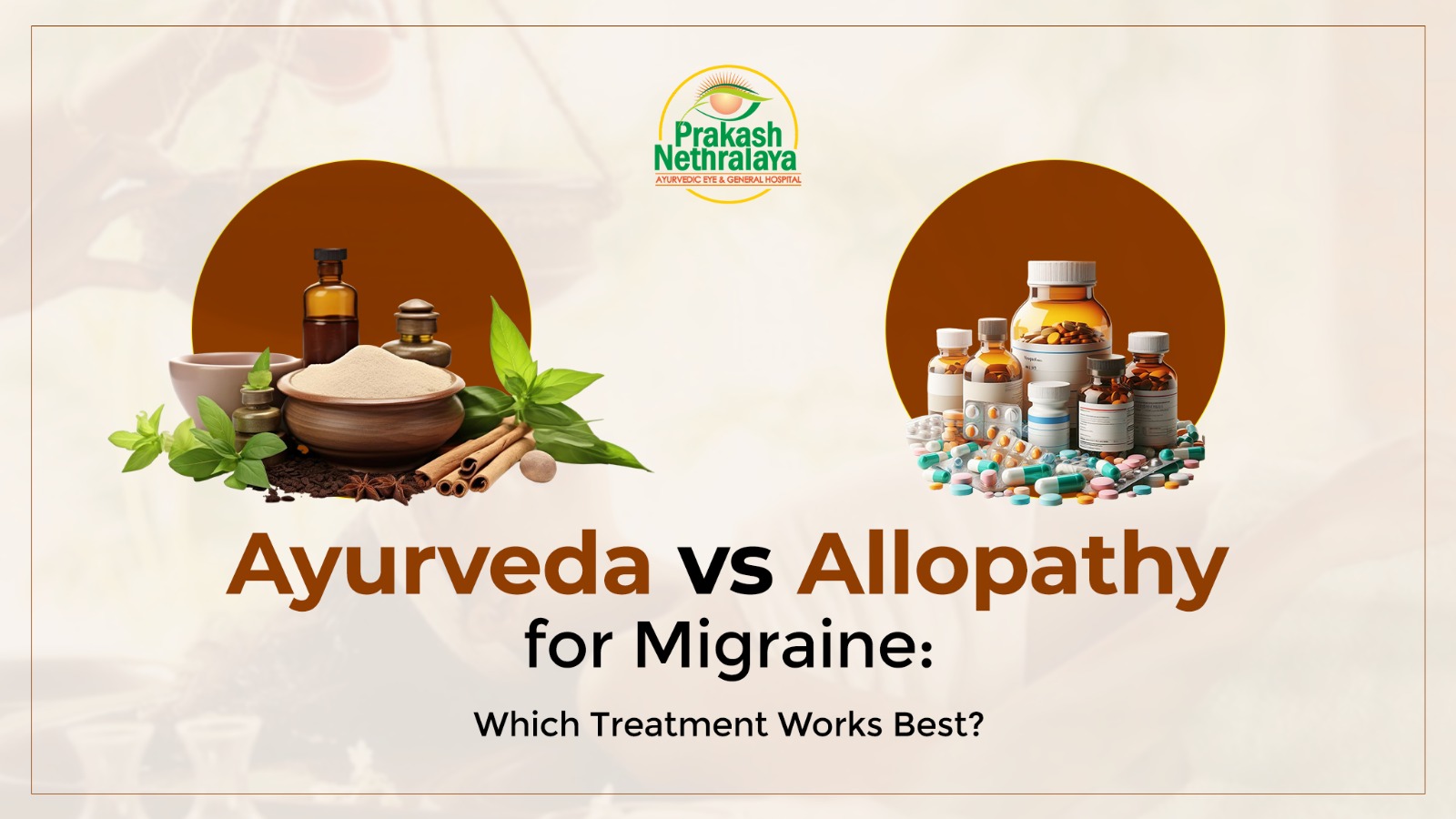Migraines are more than just headaches. They can be debilitating, recurring episodes of throbbing pain often accompanied by nausea, sensitivity to light, and visual disturbances. With millions of people worldwide affected by migraines, the search for effective and lasting relief leads many to a key question: Should you choose Ayurveda or Allopathy for migraine management?
Let’s explore both healing systems to help you make an informed choice for your health and lifestyle.
Understanding the Difference: Ayurveda vs. Allopathy
Ayurveda (Ancient Indian System of Medicine)
Migraine treatment in Ayurveda addresses the root cause of migraine by analyzing the imbalance of doshas (Vata, Pitta, and Kapha) in the body. It uses a holistic approach involving herbs, detox (Panchakarma), diet, yoga, and lifestyle changes.
Pros:
- Focuses on long-term relief by balancing the body’s natural systems
- No chemical side effects
- Emphasizes personalized treatment
- Improves overall health and mental well-being
Cons:
- Slower relief, especially in acute attacks
- Requires lifestyle commitment and consistency
- Quality and availability of practitioners may vary
Allopathy (Conventional Medicine)
Allopathy, or modern medicine, focuses on symptom management using medications like painkillers, anti-inflammatory drugs, and preventive medicines. It provides quick relief, especially during acute migraine attacks.
Pros:
- Rapid relief during attacks
- Scientific diagnostic tools (MRI, CT scans)
- Clear dosing and guidelines
- Suitable for emergency and chronic cases
Cons:
- Focus on symptom suppression rather than root cause
- Possible side effects with long-term use
- Risk of medication overuse headaches
- No personalized treatment
How Each Approach Treats Migraines
Allopathy Approach
Doctors may prescribe:
- Pain relievers like ibuprofen, paracetamol, or triptans
- Preventive drugs like beta-blockers, antidepressants, or anticonvulsants
- Supplements like magnesium or vitamin B2
These are usually prescribed after identifying the type and frequency of migraine attacks. While effective in controlling episodes, they do not cure the condition.
Ayurvedic Approach
In Ayurveda, migraines are often associated with Pitta or Vata dosha imbalances. Treatment involves:
- Panchakarma therapies like Nasya (nasal detox), Shirodhara (oil therapy), and Virechana (detoxification)
- Herbal remedies such as Brahmi, Ashwagandha, and Shankhpushpi
- Diet and lifestyle modifications to avoid migraine triggers
- Yoga and meditation to reduce stress and promote nervous system health
Ayurveda emphasizes prevention, treating not just the symptoms but the individual’s overall balance.
Which One Should You Choose?
Choose Allopathy if:
- You need quick relief from severe or sudden migraines
- You prefer short-term symptomatic treatment
- You’re experiencing frequent or chronic attacks that require immediate control
Choose Ayurveda if:
- You’re looking for long-term and sustainable relief
- You want to address the root cause naturally
- You’re open to lifestyle changes and holistic healing
- You experience side effects from allopathic medicines
The Best of Both Worlds: Integrative Care
In many cases, a combined approach may work best. For example:
- Using Allopathy for immediate relief during attacks
- Adopting Ayurvedic practices for long-term balance and prevention
Consulting both an Ayurvedic doctor and a neurologist can help create a customized and integrative treatment plan.
If You Choose Ayurveda, Trust Parkash Nethralaya and Panchkarma Kendra
If you’ve decided to explore the Ayurvedic route for long-term migraine relief, it’s crucial to choose a center with deep expertise and a trusted track record. Parkash Nethralaya and Panchkarma Kendra is a renowned Ayurvedic hospital specializing in holistic eye and neurological care, including chronic migraine treatment.
With a team of experienced Ayurvedic doctors, authentic Panchakarma therapies, and a personalized approach rooted in ancient wisdom, Parkash Nethralaya focuses on identifying the root cause of your migraines and treating them through safe, natural, and sustainable methods.
Patients from across India and abroad visit the center for its comprehensive treatment plans that combine:
- Ayurvedic detox (Panchakarma)
- Herbal medication tailored to your dosha
- Diet and lifestyle correction
- Stress-relieving therapies like Nasya and Shirodhara
If you’re seeking a drug-free, long-lasting, and side-effect-free solution to migraine, Parkash Nethralaya can guide you on your healing journey. You can reach out to us and consult ayurvedic doctor online via video call as per your availability.
Conclusion
Migraines can be complex and deeply personal. Whether you choose the quick fixes of Allopathy or the holistic healing of Ayurveda, the right path depends on your needs, health goals, and belief system.
If you’re struggling with chronic migraines, consider exploring both systems — not as competitors, but as complementary allies in your journey toward lasting relief.



